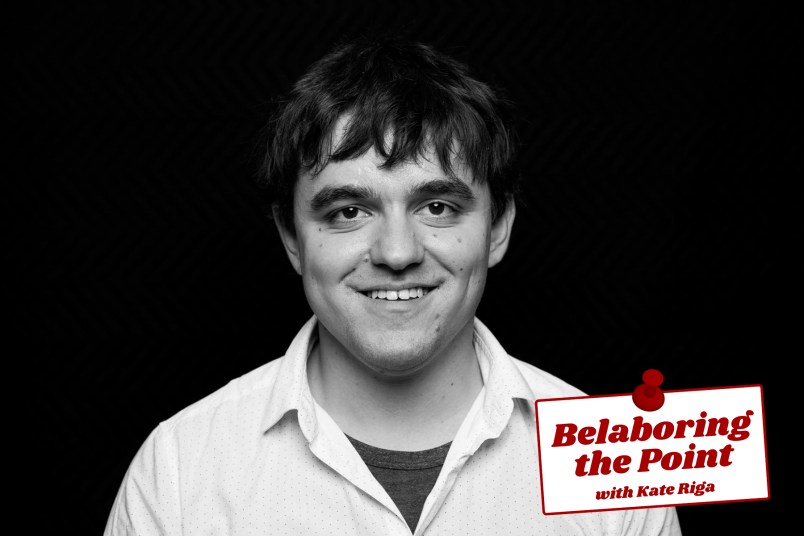This isn’t a Thanksgiving Day question exactly, but a question on Thanksgiving Day nonetheless.
What do we know exactly about Abu Musab Zarqawi?
According to various news accounts he is the chief jihadist/insurgent in Iraq. He is the head of the Iraqi ‘branch’ of al Qaida, the local subsidiary. Responsibility for numerous bombings and atrocities has been ascribed to him; or, in other cases, he, his supporters, or those speaking for him seem happy to take responsibility themselves.
But it is hard not to see this information in the light of the fairly constant tendency through the War on Terror to build up varous Terrorist Masterminds, who become the focus of most or all news reportage, then trail off into nothing. Not infrequently, they have an uncanny resemblance to characters out of 1984. And with Zarqawi particularly there is a welter of contradictory and often difficult-to-credit information about him that invites further suspicion.
Remember, we first heard of Zarqawi because his alleged 2002 trip to a Baghdad hospital to have his leg amputated was the sign of Saddam’s dalliance with al Qaida figures. Only now he seems to have two legs. So, assuming he’s not some sort of amphibian who can regenerate limbs, that story doesn’t pan out.
With some regularity he is apparently killed, but then turns out not to be dead. Often, if you read between the lines, it’s not clear that we know enough about Zarqawi to be able to identify him even if we had a relatively intact body to examine. In a similarly odd fashion, second-in-commands seem to be caught with some regularity, only to be replaced by other long-time second-in-commands.
Now, I haven’t followed the Zarqawi story that closely. I’ve just observed it over time as many of you have. So probably or perhaps some of this information has been nailed down more securely than I’ve suggested. And if so, please let me know — the questions I’m asking here are not purely rhetorical.
But let’s recognize that Zarqawi’s enemies and his supporters — probably, the man himself above all — have a common interest in building up his reputation and his centrality. The Bush administration has consistently tried to portray al Qaida as a distinct, coherent and hierarchical organization, even in the face of evidence that, since the Afghan War, it has fragmented (or metastasized) into something more like a movement than an organization. This is particularly the case in Iraq where the administration has sought to bundle various sorts of terrorist and paramilitary violence into the al Qaida basket. So building up Zarqawi into the Iraq’s al Qaida boss must be tempting.
You needn’t posit intentional deception. In a case as chaotic and bloody as Iraq, the mind naturally looks for hidden organization and hierarchy, definable culpability, particularly if you’re the one on the line for stopping the violence.
Now, clearly, Iraq has become a charnel house. And there has been a relatively constant stream of terrorist attacks around the world — Bali, London, Madrid, Amman, Riyadh, the list goes on and on. The perpetrators all seem at least inspired by bin Laden or bin Ladenism and many of the ringleaders were trained in Afghanistan before the war.
But I’m curious-bordering-on-suspicious about just what we know about Zarqawi, how much specific information we have about who he is and what attacks he may be responsible for.
This article which appeared last year in Newsday contains one of the few detailed skeptical accounts of his role …
Whenever a car bombing, beheading or other spectacular act of violence takes place in Iraq these days, American officials are quick to blame Abu Musab al-Zarqawi. If he hasn’t already taken responsibility himself.
But according to an Arab intelligence assessment, al-Zarqawi is not capable of carrying out the level of attacks in Iraq that he has claimed and that American officials have blamed on him.
Al-Zarqawi’s own militant group has fewer than 100 members inside Iraq, although al-Zarqawi has close ties to a Kurdish Islamist group with at least several hundred members, according to two reports produced by an Arab intelligence service.
Kurdish group Ansar al-Islam has provided dozens of recruits for suicide bombings since the United States-led invasion of Iraq, the reports say. And while US forces relentlessly pound the Sunni insurgent strongholds of Fallujah and Samarra, claiming to hit al-Zarqawi safe houses, the elusive militant could be hiding in the northern city of Mosul.
The Jordanian-born al-Zarqawi, 37, has used the media effectively to inflate his role in the Iraqi insurgency. In recent months, he and his supporters have claimed responsibility for scores of suicide bombings, attacks on US and Iraqi forces, kidnappings and beheadings of foreigners, and coordinated uprisings in several Iraqi cities.
Al-Zarqawi is thought likely responsible for the beheadings of American contractor Nicholas Berg and several other foreigners. But the sheer level of other attacks that he has claimed is not consistent with the number of supporters he has inside Iraq and his ability to move around the country, according to the analysis. The reports say former members of Saddam Hussein’s Baathist regime are responsible – directly or by paying others – for many of the attacks, especially sophisticated roadside bombings and ambushes of US troops.
The assessment contradicts many of the Bush administration’s statements about al-Zarqawi and his terrorist network.
So what I’d ask is this. I’m interested in seeing articles — from reputable news organizations — which give specific information about Zarqawi and what reliable information we have connecting him to these various attacks.
Are we getting the straight story? Or are we falling victim to the ironically overlapping needs of Bush administration officials and Zarqawi himself to over-inflate his role and give us all a highly distorted impression of just what is going on in Iraq?






